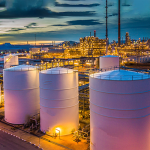Projects in Petrochemical Plants
Petrochemical plants involve a wide range of complex engineering projects related to design, construction, commissioning and operation. Some key project types in petrochemical plants are:
Design projects:
• Process design: Designing chemical reactions, separation processes, heat exchange systems and material flow sheets for new petrochemical units.
• Equipment design: Designing reactors, distillation columns, heat exchangers, pumps, pipes and vessels according to process requirements.
• Plant layout: Optimal arrangement of process units, utility systems, tanks and other facilities within the plant.
• Control systems: Design of instrumentation and control systems for monitoring and regulating the process.
Construction projects:
• Civil works: Construction of plant foundation, roads, drainage systems, tank foundations, etc.
• Equipment erection: Installation of process equipment like distillation columns, reactors, pipes, heat exchangers, pumps, etc.
• Piping: Fabrication and installation of piping networks to connect process units.
• Electrical: Installation of power cables, control cables and instrumentation cables.
Petrochemical

Commissioning and startup projects:
• Pre-commissioning: Checklists,Testing and inspection of equipment before startup.
• Commissioning: Gradual introduction of utilities and initial operations to verify performance.
• Trial runs: Limited production runs to verify design through actual operations.
• Ramp-up: Gradually increasing plant capacity until design rate is achieved.
Operation and maintenance projects:
• Turnaround maintenance: Planned shutdowns for inspecting and repairing equipment.
• Debottlenecking: Modifications to increase plant capacity beyond original design.
• Product upgrades: Changes in product slate or product specifications.
• Safety and environmental projects: Initiatives to improve safety and reduce emissions.
So in summary, projects in petrochemical plants span the entire life cycle from conceptual design to operation and continuous improvement. They require effective project management and integration of multidisciplinary engineering work.

 Submit your manual request
Submit your manual request Chemistry
Chemistry Construction
Construction Control
Control Counseling
Counseling Design and Engineering
Design and Engineering Electricity
Electricity Equipment repair
Equipment repair Instrumentation
Instrumentation Mechanic
Mechanic oil
oil Operation, Repair and Maintenance
Operation, Repair and Maintenance Overhaul
Overhaul Period services
Period services Test & Commissioning
Test & Commissioning Trade
Trade